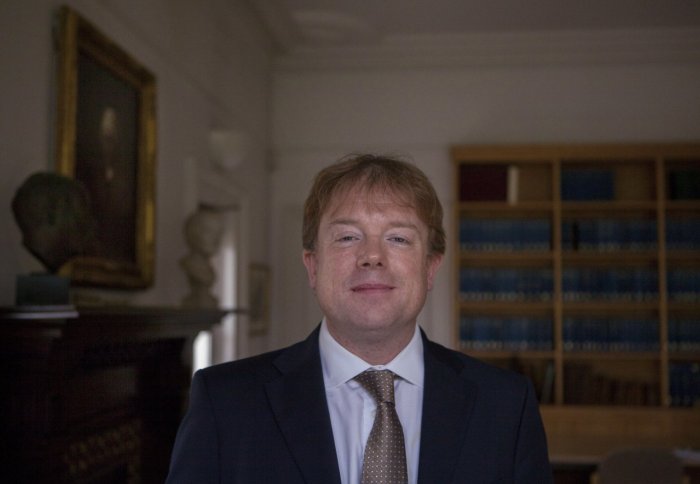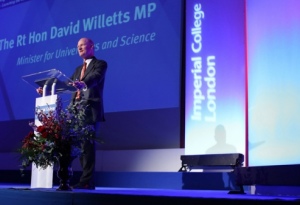Interview: Nick Hillman, Director of HEPI

Leading higher education expert Nick Hillman is to visit Imperial later this week.
Nick, Director of the Higher Education Policy Institute (HEPI), who served as Special Adviser to former Universities and Science Minister David Willetts until 2013, will deliver a lecture on Thursday about the threats and opportunities facing higher education in 2015.
Ahead of the talk, which is part of the Perspectives in Education series organised by Vice Provost (Education) Professor Debra Humphris, Nick shared his views on the upcoming election, his experience in government and how the scientific community could improve its case for public funding.
Student power
Nick seems to be relishing his post-government role, having spent years in Whitehall and Westminster. He enthuses about HEPI’s independence. The think tank takes no editorial line, which he says frees it to “go where the research and the evidence takes us, and sometimes that means making ourselves unpopular in the corridors of power and elsewhere.”

Nick's former boss David Willetts at Imperial
With politics still very much on Nick’s mind at HEPI, in December the Institute published a detailed study on the electoral power of students. Something that had, surprisingly, not been done before. “The NUS say students are a very important group of voters, and other people say students aren’t. We had a psephologist at Oxford crunch the data for us.” Among HEPI’s findings were that student voters are swinging from the Liberal Democrats to Labour to such a degree that they could affect the result in around 10 seats this May.
In constituencies where students are set to play a decisive electoral role, their changing voting intentions often reflect dissatisfaction with the post-2012 tuition fee system in England – a policy that Nick helped craft as a Special Advisor in the Department for Business Innovation and Skills (BIS).
Fee reforms
“I was in government when fees were tripled to £9,000 and the consensus was that this would be bad for students from disadvantaged households,” he reflects. “That was absolutely the overwhelming consensus prediction of all sorts of people. The reality has turned out to be the precise opposite of that.”
The new fee system – with its income contingent repayments and extra student support – has not discouraged students from poorer backgrounds from applying to university. Nonetheless, the higher education sector “still has a big job to do” to explain the costs of undergraduate education to students and politicians if they want such funding to be sustained.
The science community cannot do enough to show that additional spending will be beneficial to the country.
– Nick Hillman
Director, HEPI
Nick is acutely aware of the political implications. “Imagine you are the MP for a marginal seat that doesn’t have a university in it, and then remember there is only one way to raise tuition fees in the UK, and that is a vote on the floor of the House of Commons,” he says. “So, if you’re a marginal MP who’s at risk of losing their seat, who doesn’t think about higher education very often because you don’t have a university in your constituency, and you think your political party has already taken a lot of pain on fees, would you really vote to increase fees? And if the answer to that question is, ‘No, I don’t think I would vote to increase fees,’ then that means the sector still has a lot of lobbying to do, if it think it’s got a strong case.”
If universities do not do more to explain their costs, he foresees a risk that students “will do a very simple calculation in their heads, where they say, ‘I’m paying £9,000, I’m getting X hours a week,’ (though he notes quickly that “X is higher at Imperial than it would be at many other places”). “That will happen unless we as a sector say to students, ‘Remember that library over there is paid for by your fees. Remember those sports facilities. The students’ union facilities. The career centre. All these things are paid for by your fees as well.’”
Research prospects
Nick takes a sombre view of UK research funding over the next parliament, as “all three of the main political parties say that they’re not willing to protect the BIS budget, and if you’re not willing to protect the BIS budget, then BIS is in line for a cut. The question then is which bits of the BIS budget takes the cut?”
“The BIS spending goes on higher education, further education and research,” Nick explains. “So I think it is very hard, when you bear in mind the students number cap coming off, that all the parties want to do more in apprenticeships” as well as supporting science and research.
We continue to have well-funded, world class universities, of which other countries are very jealous, and they’re right to be jealous.
– Nick Hillman
Director, HEPI
Nick urges the scientific community to keep making the economic case that state investment in research incentivises additional private investment. “The science community cannot do enough, and it still needs to do more to produce the evidence to show that additional spending will crowd in more private funding and be beneficial to the country.”
But these arguments are not simple, Nick cautions: “the science budget has done relatively well in recent years. It’s been protected from the cuts. And that has led the science community to think they were much better lobbyists than they actually are.”
As Nick found in government, during the spending review, “Every department and interest group in Whitehall says to the Treasury, ‘We’ve got a special case. If you give us money, we’ll save you more money in the future, we’ll give you money in the long term,’ and you have to have the most robust case possible.” But the flat-cash protection of the science budget in 2010 “was as much a personal decision of David Willetts and George Osborne as it was that the evidence base was so strong”.
The great success of institutions like Imperial, even in challenging economic times, does not always make the argument easier. “One of the challenges we have, is all the evidence shows our research base is very successful, world class, and also very efficient.” We’re getting “masses of bang for our buck,” but that “tempts Treasury bean counters to say, ‘Hang on, you’re so efficient, why do you need any more money?’”
Universities like Imperial have proven they can do more with less, but now they need to show they could do even more with more. “The challenge for the sector is to prove that they wouldn’t lose efficiency, but they would be doing a whole lot better if there was even more resource around, and that it is a key part of the UK pulling itself out of the tricky financial times that large parts of the world have seen.”
International students, Conservative criticisms
Although Nick worked for a Conservative minister and ran as the Tory parliamentary candidate for Cambridge in the last general election, he is refreshingly forthright in criticising his own party.
The UK is brilliant at education, and we should attract as many international students as we possibly can.
– Nick Hillman
Director, HEPI
He worries that we send out “mixed messages” about how welcome international students are, putting them through “hoops and hurdles,” noting Theresa May’s recent idea to force people to go home before they can apply for a graduate job in the UK.
Even UKIP, who many Tories have sought to follow rightwards, accepts the case for removing international students from the UK’s migration statistics. In Nick’s view, “sadly, it matters where UKIP are on this”. He observes that the Conservatives are “less worried about being outflanked on the right”.
Nick says the 2015 Conservative manifesto is “the big unknown” in this area. But if he were in charge, it might say, “The UK is brilliant at education, brilliant at high level skills and we should attract as many international students as we possibly can, so long as they’re not displacing home students – and actually they don’t. All the evidence is the opposite… they don’t displace home students, they help cross subsidise them; and, if anything, provide extra opportunities for home students.”
He adds that the government has “got itself in a hole on this,” suggesting that the Tory manifesto offers an opportunity to get out of the hole rather than “repeat failed policies”. He would like to see a new approach centred on providing a really warm welcome to proper, legitimate students, and not counting them as immigrants in the statistics.
Capital advantage

Imperial West
Whatever the immediate policy and political challenges, Nick is bullish about the future of universities like Imperial. He sees the College’s London location as a particular advantage. “I think there are exciting things going on across the whole of London, because you’ve got Imperial West, you’ve got the Crick Institute, you’ve got things that are going on at the Olympic Park.” Highlighting that leading London institutions like Imperial and LSE seem to carry a particular weight abroad, he says, “they seem to be among the UK’s crown jewels when looked at from outside in”.
Whitehall reflections
Having moved from a high-pressure government job to the relative freedom of a specialist think tank, does the former SpAd miss anything about government?
“The thing about sitting in Whitehall, it’s got its challenges, red tape, bureaucracy, cuts, all those things, but it is like sitting inside the machine that is running the country. So instead of reading a newspaper and getting second, third or fourth hand information about the decision making processes at the heart of the country, you are actually in there. You are a very small cog, but in a very large machine. And that is absolutely fascinating, because you genuinely see how the country is run, in all its messiness.”
Nick’s experience actually left him more optimistic about government, and indeed universities: “I personally think we actually live in quite a well-governed country. It has its scandals and stuff, but I actually think higher education is a good example of that. Whatever the controversies, we continue to have well-funded, world class universities, of which other countries are very jealous, and they’re right to be jealous.”
Article text (excluding photos or graphics) © Imperial College London.
Photos and graphics subject to third party copyright used with permission or © Imperial College London.
Reporter
Andrew Scheuber
Communications Division